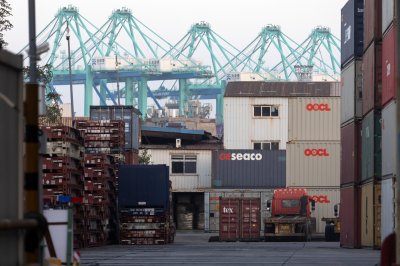
Shipping containers are seen at the port in Tianjin, China, Tuesday. The United States and China started charging one another port fees. Photo by Jessica Lee/EPA
Oct. 14 (UPI) — The Trump administration recently began charging fees for Chinese ships docking at U.S. ports, prompting China to retaliate.
The move, which has been long planned, is intended to correct the imbalance between American and Chinese shipbuilding businesses. The U.S. shipbuilding business has dwindled over the years as China has become dominant.
On Friday, China vowed reciprocal fees on American-made ships in its ports.
“This is symbolic — less than 1% of U.S. vessels docking in China annually are U.S.-flagged vessels, so the reality is this basically has no real impact,” Cameron Johnson, a senior partner at Shanghai-based supply chain consultancy Tidalwave Solutions, told Politico. “But it signals that Beijing will match every single effort the United States targets against China — if the U.S. sanctions a Chinese company, they’re going to sanction a U.S. company. If we impose export controls on technology, they’re going to do export controls on technology. We have just now escalated to a whole new level of trade warfare that nobody was expecting.”
Supporters say that China has used subsidies for an advantage in shipbuilding, and that the fees can deter ocean carriers from buying Chinese ships, The New York Times reported.
“Anything we can do to chip away at the disparity in shipbuilding that exists between the United States and China is to our benefit,” Mihir Torsekar, a senior economist at the Coalition for a Prosperous America, a group that supports many of Trump’s trade moves, told The Times.
Chinese-owned shipping companies must pay the levies, as well as non-Chinese-owned companies, when they send Chinese-made ships to U.S. ports.
The new fees will also target all foreign car-carrying ships that come to the United States. Car-makers lobbied against the fees, arguing that they could add hundreds to the cost of a vehicle. Shipping analysts say it could take many years for the U.S. shipbuilding industry to build a car-carrier ship.
“The idea that these fees will lead to anyone ordering a U.S.-built car carrier are, I think, extremely remote,” Colin Grabow, an associate director at the Cato Institute, told The Times.
The port fees levied against Chinese ships are $50 per ton, with the fee set to increase by $30 per ton each year over the next three years. Politico reported. China’s port charges will also annually escalate to a maximum of $157 in 2028.
“If the goal is to get U.S. shipbuilding back up and running, we think there are other ways that we need to focus on doing that — just putting fees on Chinese vessels isn’t going to solve that issue,” said Jonathan Gold, vice president of supply chain and customs policy at the National Retail Federation, told Politico.